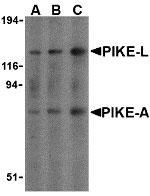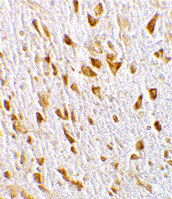PIKE Antibody
- SPECIFICATION
- CITATIONS
- PROTOCOLS
- BACKGROUND

Application
| WB, IHC-P, E |
|---|---|
| Primary Accession | Q99490 |
| Other Accession | AAM97540, 25989575 |
| Reactivity | Human, Mouse |
| Host | Rabbit |
| Clonality | Polyclonal |
| Isotype | IgG |
| Calculated MW | 124591 Da |
| Application Notes | PIKE antibody can be used for detection of PIKE by Western blot at 0.5 to 2 µg/mL. Antibody can also be used for immunohistochemistry starting at 10 µg/mL. |
| Gene ID | 116986 |
|---|---|
| Other Names | PIKE Antibody: PIKE, GGAP2, CENTG1, KIAA0167, Arf-GAP with GTPase, ANK repeat and PH domain-containing protein 2, Centaurin-gamma-1, AGAP-2, ArfGAP with GTPase domain, ankyrin repeat and PH domain 2 |
| Target/Specificity | AGAP2; Anti-PIKE will detect both PIKE-L and PIKE-A isoforms. |
| Reconstitution & Storage | PIKE antibody can be stored at 4℃ for three months and -20℃, stable for up to one year. As with all antibodies care should be taken to avoid repeated freeze thaw cycles. Antibodies should not be exposed to prolonged high temperatures. |
| Precautions | PIKE Antibody is for research use only and not for use in diagnostic or therapeutic procedures. |
| Name | AGAP2 |
|---|---|
| Synonyms | CENTG1, KIAA0167 |
| Function | GTPase-activating protein (GAP) for ARF1 and ARF5, which also shows strong GTPase activity. Isoform 1 participates in the prevention of neuronal apoptosis by enhancing PI3 kinase activity. It aids the coupling of metabotropic glutamate receptor 1 (GRM1) to cytoplasmic PI3 kinase by interacting with Homer scaffolding proteins, and also seems to mediate anti-apoptotic effects of NGF by activating nuclear PI3 kinase. Isoform 2 does not stimulate PI3 kinase but may protect cells from apoptosis by stimulating Akt. It also regulates the adapter protein 1 (AP-1)-dependent trafficking of proteins in the endosomal system. It seems to be oncogenic. It is overexpressed in cancer cells, prevents apoptosis and promotes cancer cell invasion. |
| Cellular Location | [Isoform 1]: Cytoplasm. Nucleus. |
| Tissue Location | Isoform 1 is brain-specific. Isoform 2 is ubiquitously expressed, with highest levels in brain and heart |

Thousands of laboratories across the world have published research that depended on the performance of antibodies from Abcepta to advance their research. Check out links to articles that cite our products in major peer-reviewed journals, organized by research category.
info@abcepta.com, and receive a free "I Love Antibodies" mug.
Provided below are standard protocols that you may find useful for product applications.
Background
PIKE Antibody: Phosphoinositide 3 kinase enhancer (PIKE) is a recently identified nuclear GTPase that interacts with nuclear phosphoinositide 3-kinase (PI3 kinase) to stimulate its lipid kinase activity. PIKE exists in multiple isoforms; a shorter C-terminal isoform (PIKE-A) has also been identified as centaurin gamma 1. The longest isoform (PIKE-L) has been shown to bind to the adaptor protein Homer and thereby link to metabotropic glutamate receptors, leading to activation of PI3 kinase activity and prevention of neuronal apoptosis. Overexpression of PIKE-A enhances Akt activity and promotes cancer cell invasion, whereas decreased expression of PIKE-A via dominant negative expression of PIKE-A or PIKE-A knockdown inhibits these processes. In many human cancers, expression of PIKE-A is enhanced, leading to increased Akt activity and preventing apoptosis.
References
Ye K, Hurt KJ, Wu FY, et al. Pike. A nuclear gtpase that enhances PI3kinase activity and is regulated by protein 4.1N. Cell 2000; 103:919-30.
Jackson TR, Kearns BG, and Thiebert AB. Cytohesins and centaurins: mediators of PI3-kinase-regulated Arf signaling. Trends Biochem. Sci. 2000; 25:489-95.
Rong R, Ahn JY, Huang H, et al. PI3 kinase enhancer-Homer complex couples mGluRI to PI3 kinase, preventing neuronal apoptosis. Nat. Neurosci. 2003; 6:1153-61.
Ahn J-Y, Rong R, Kroll TG, et al. PIKE (Phosphotidylinositol 3-kinase enhancer)-A GTPase stimulates Akt activity and mediates cellular invasion. J. Biol. Chem. 2004; 279:16441-51.
If you have used an Abcepta product and would like to share how it has performed, please click on the "Submit Review" button and provide the requested information. Our staff will examine and post your review and contact you if needed.
If you have any additional inquiries please email technical services at tech@abcepta.com.













 Foundational characteristics of cancer include proliferation, angiogenesis, migration, evasion of apoptosis, and cellular immortality. Find key markers for these cellular processes and antibodies to detect them.
Foundational characteristics of cancer include proliferation, angiogenesis, migration, evasion of apoptosis, and cellular immortality. Find key markers for these cellular processes and antibodies to detect them. The SUMOplot™ Analysis Program predicts and scores sumoylation sites in your protein. SUMOylation is a post-translational modification involved in various cellular processes, such as nuclear-cytosolic transport, transcriptional regulation, apoptosis, protein stability, response to stress, and progression through the cell cycle.
The SUMOplot™ Analysis Program predicts and scores sumoylation sites in your protein. SUMOylation is a post-translational modification involved in various cellular processes, such as nuclear-cytosolic transport, transcriptional regulation, apoptosis, protein stability, response to stress, and progression through the cell cycle. The Autophagy Receptor Motif Plotter predicts and scores autophagy receptor binding sites in your protein. Identifying proteins connected to this pathway is critical to understanding the role of autophagy in physiological as well as pathological processes such as development, differentiation, neurodegenerative diseases, stress, infection, and cancer.
The Autophagy Receptor Motif Plotter predicts and scores autophagy receptor binding sites in your protein. Identifying proteins connected to this pathway is critical to understanding the role of autophagy in physiological as well as pathological processes such as development, differentiation, neurodegenerative diseases, stress, infection, and cancer.



